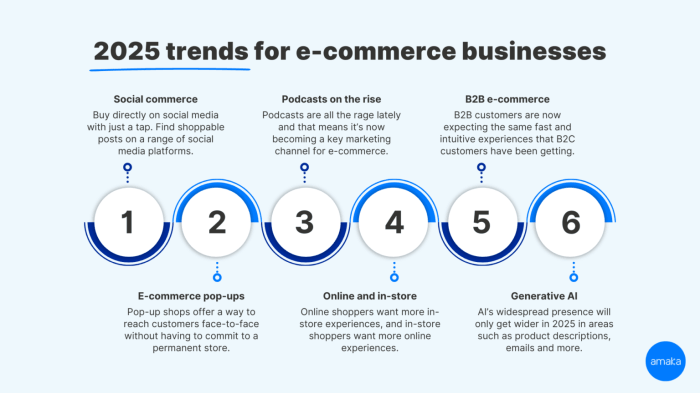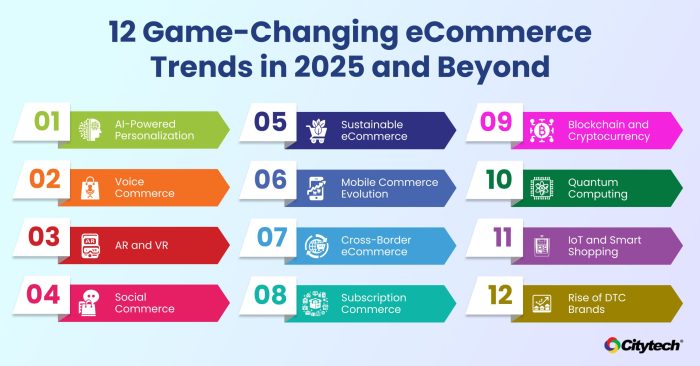As we delve into the realm of Social Commerce Trends Driving Sales in 2025, we uncover the exciting advancements and innovations that are set to reshape the landscape of online shopping. From personalized shopping experiences to the influence of AI and influencers, this exploration promises to be enlightening and forward-thinking.
Social Commerce Platform Enhancements

In 2025, social commerce platforms are expected to undergo significant enhancements to drive sales through improved user experiences and the integration of artificial intelligence technologies.
Enhanced Personalization Features
- Social commerce platforms in 2025 will utilize advanced AI algorithms to provide highly personalized product recommendations based on user preferences, browsing history, and social interactions.
- Users will experience a more tailored shopping journey with curated content, customized promotions, and targeted advertisements, leading to higher conversion rates and increased sales.
Interactive Shopping Experiences
- Future social commerce platforms will offer interactive features such as virtual try-on tools, augmented reality shopping experiences, and live streaming shopping events to engage users and enhance the overall shopping experience.
- By enabling customers to visualize products in real-time and interact with sellers in a more immersive way, these platforms will drive higher levels of user engagement and boost sales.
Seamless Integration of Social Media
- In 2025, social commerce platforms will seamlessly integrate with popular social media networks, allowing users to make purchases directly within their social feeds without having to switch between multiple apps or websites.
- This integration will streamline the buying process, reduce friction for users, and create a more convenient shopping experience, resulting in increased sales and improved customer satisfaction.
Personalized Shopping Experiences
Personalized shopping experiences are revolutionizing the way consumers interact with brands on social commerce platforms. By leveraging sophisticated algorithms, businesses can tailor product recommendations, promotions, and content based on individual preferences and behaviors, ultimately enhancing customer satisfaction and driving sales.
Successful Personalized Marketing Strategies
- Amazon’s personalized product recommendations based on past purchases and browsing history have significantly increased customer engagement and conversion rates.
- Spotify’s personalized playlists and recommendations have created a highly engaging music discovery experience for users, leading to increased subscription renewals and user retention.
- Netflix’s algorithm-driven content suggestions have played a crucial role in keeping users engaged and satisfied, resulting in higher viewer ratings and reduced churn rates.
Importance of Data Analytics
Data analytics play a pivotal role in creating tailored shopping experiences on social commerce platforms. By analyzing customer data such as browsing history, purchase behavior, demographic information, and social interactions, businesses can gain valuable insights into individual preferences and interests.
This data-driven approach enables companies to deliver personalized recommendations, targeted promotions, and relevant content to each customer, ultimately enhancing the overall shopping experience and driving sales.
Influencer Marketing Evolution
Influencer marketing has evolved significantly over the years, becoming a key strategy for brands to reach their target audience on social media platforms. The shift in influencer marketing strategies has had a profound impact on driving sales and shaping consumer behavior.
Role of Nano and Micro-Influencers
Nano and micro-influencers, with smaller but highly engaged followings, are gaining prominence in the future landscape of social commerce. These influencers have a more genuine and authentic connection with their followers, leading to higher levels of trust and credibility. Brands are increasingly turning towards nano and micro-influencers to promote their products or services, as they offer a more cost-effective way to reach niche audiences and drive conversions.
- Nano and micro-influencers often have a more targeted and engaged audience compared to macro influencers, resulting in higher conversion rates.
- Collaborating with nano and micro-influencers allows brands to tap into specific demographics or niche markets that may be harder to reach through traditional advertising methods.
- These influencers are seen as relatable and trustworthy by their followers, making their recommendations more influential in driving purchasing decisions.
Effectiveness of User-Generated Content
User-generated content (UGC) plays a significant role in influencing purchasing decisions on social platforms. Consumers are more likely to trust recommendations and reviews from fellow consumers rather than traditional advertising. Incorporating UGC into influencer marketing campaigns can further enhance authenticity and credibility, leading to increased engagement and sales.
- UGC provides social proof and authenticity, creating a sense of community and trust around a brand or product.
- When influencers share user-generated content, it amplifies the reach and impact of the campaign, as followers are more likely to relate to real-life experiences and testimonials.
- Brands can encourage customers to share their experiences through UGC contests or campaigns, leveraging the power of peer recommendations to drive sales.
Augmented Reality and Virtual Try-Ons

Augmented Reality (AR) and virtual try-ons are transforming the landscape of social commerce by offering consumers a more interactive and personalized shopping experience. With AR technology, shoppers can visualize products in a virtual space, enabling them to make more informed purchasing decisions.
Brands Embracing AR Technology
- One prominent example of a brand utilizing AR for product visualization is IKEA, allowing customers to see how furniture pieces would look in their homes before buying.
- Cosmetic brands like Sephora and L’Oreal have developed virtual try-on features, enabling users to test makeup products virtually.
- Warby Parker, an eyewear brand, offers a virtual try-on tool that allows customers to see how different glasses frames look on their faces.
Impact on Sales
- Implementing AR technology has led to increased engagement and conversion rates for many brands.
- By offering virtual try-ons, companies can reduce returns and enhance customer satisfaction by providing a more realistic shopping experience.
- Studies have shown that products with AR features have higher perceived value, leading to a potential boost in sales.
Future Potential of AR in Online Shopping
- As AR technology continues to evolve, we can expect even more advanced features that will further enhance the online shopping experience.
- Personalized AR experiences tailored to individual preferences could become the norm, creating a more immersive and interactive shopping environment.
- The integration of AR with social media platforms could lead to a seamless shopping journey, blurring the lines between online and offline retail experiences.
Epilogue
In conclusion, the future of social commerce in 2025 is brimming with possibilities and opportunities for businesses to thrive in the digital age. By embracing these trends and staying ahead of the curve, companies can position themselves for success in the rapidly evolving world of online retail.
FAQ Overview
How will AI impact social commerce platforms in 2025?
AI will play a crucial role in enhancing user experiences, providing personalized recommendations, and streamlining the shopping process.
What are some examples of successful personalized marketing strategies on social media?
Examples include targeted ads based on user behavior, personalized product recommendations, and interactive shopping experiences.
How do nano and micro-influencers contribute to the future of social commerce?
These influencers are seen as more authentic and relatable, leading to higher engagement and trust among consumers, ultimately driving sales.
What is the significance of augmented reality in online shopping?
AR enhances the shopping experience by allowing customers to visualize products in real-world settings before making a purchase, leading to increased sales and customer satisfaction.


